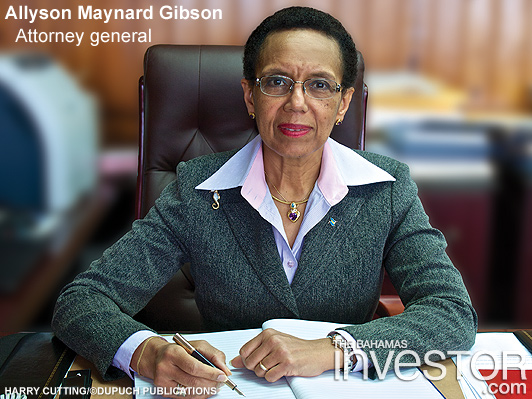| Published: Date: Updated: Author: |
The Bahamas Investor Magazine January 21, 2014 January 21, 2014 Catherine Morris |
In her second term as attorney general, Minister of Legal Affairs Allyson Maynard Gibson is spearheading efforts to improve efficiency in the legal sector, streamlining processes within the Registrar General’s Department and making justice more accessible—initiatives that she says will also impact the financial services sector, increasing investor confidence and making it easier to do business in The Bahamas.
“The most important issue facing the legal sector today is efficiency in the administration of justice,” says the leading legal professional, whose first term in office was 2004-2008, returning to the post for a second time in 2012 when the Progressive Liberal Party regained power. “There are matters taking too long to be heard, they are delayed in getting to court and, once heard, they are taking too long to get judgment.
“This translates to the country’s ease of doing business rating. Whether domestic or international, investors want to know that when they have a dispute, it will be brought to court quickly, dealt with quickly and receive a judgment quickly.”
Efficiency in the courts
When taking office in May 2012, the AG found the courts burdened with a backlog of cases waiting to be resolved and made clearing this backlog one of her first priorities. Under the government’s Swift Justice initiative there are plans to increase the number of active criminal courts from six to 10, as well as making provisions for a greater number of judges and making it easier for people to serve on juries. In addition, it will become easier for the public to access court reports and transcripts, improving transparency and accountability in the system.
According to Gibson, this will only come about with a concerted effort between the various entities involved in the sector. “We need all agencies to be involved in the administration of justice sitting together on a regular basis to make sure that all the things that need to be in place for a trial to happen are there. We were not talking to each other. Now we are talking and planning months ahead. There is no magic wand to fix the systemic problems, but we are seeing good results.
“It is my hope that people feel that my work has contributed to making justice more efficient and accessible. That is what I am working very hard towards. All people within our borders should feel that they can easily approach our courts, get justice and consistently have their disputes resolved quickly.”
Streamlining business administration
It is not just the courts that are undergoing an overhaul. The AG is also focusing on the Registrar General’s Department, utilizing technology to streamline business. Soon it will be possible to incorporate a company online, thanks to new software that the AG’s office hopes will be in place in the very near future. The system will charge a premium for those who want their application processed immediately, while others can pay the standard fee to become incorporated within 48 hours.
One of the added benefits of moving online is that it allows the system to create a database of pertinent information, which can then be drawn on as needed. In addition to forming a company online, people will also be able to dissolve them. This year, the Registrar General’s Department will introduce online dissolution of international business companies (IBCs)—allowing for speedy dissolution of companies in straightforward cases where the registrar does not need to use its discretion.
Within the next 12 months, the department also hopes to begin processing certain types of deeds and documents electronically, such as birth and death certificates and maritime marriages.
All of these new initiatives were developed with input from committees representing both the public and private sectors. This is key, says the AG, who believes that the government must work closely with the private sector to accommodate its interests and devise a system that will meet their needs.
“They are the mouthpiece for us,” she says. “We want Bahamian and non-Bahamian investors to understand that there is close public and private sector cooperation and collaboration. That is critical to our success.”
Modernizing these systems by bringing them online is an important element in ensuring The Bahamas maintains its competitive edge. “We cannot just keep up; we have to be ahead of the game. If you are maintaining a steady pace, you are really getting left behind,” says Gibson. “We want to keep The Bahamas competitive.”
In addition to a backlog of court cases, the AG’s office is also tackling a backlog in trademark applications. Once these are dealt with, Gibson wants to see The Bahamas’ intellectual property registry become accredited by the World Intellectual Property Organization (WIPO)—a move that she says will help The Bahamas in its bid to become a fully accredited member of the World Trade Organization by the end of this year.
The WIPO is currently assisting the department in creating an electronic registry. “The Bahamas will be seen as a serious and very credible jurisdiction for intellectual property (IP) when our IP registry is consistent, accurate and reliable,” she says.
“It does not matter what the legislation says, if you do not have the support in the registry. This is a major project. We want to have it in place as soon as possible. We are moving diligently.”
Promoting the financial sector
As a former Minister of Financial Services and Investment and a founding director of the Bahamas Financial Services Board (BFSB), Gibson is well aware of how the legal sector can assist the financial services industry in The Bahamas, particularly in an era where transparency and compliance are gaining greater prominence.
In November 2013, Gibson was appointed president of the Caribbean Financial Action Task Force (CFATF). She is excited about her new role and sees it as a means to promote the jurisdiction.
“This is an opportunity for all of those in financial services to demonstrate that we understand that a well-regulated financial services sector actually attracts inbound investment. It is our job to be the mouthpiece for the region, making it clear we understand that a strong anti-money laundering and anti-terrorism financial regime enhances inbound investment and national development.” As CFATF president, she says wants to see more Bahamians representing their country on international regulatory bodies in this way. “There is nothing I can think of that Bahamians cannot do. We have shown the world that we have a deep pool of Bahamian intellectual capital and a government committed to financial services.”
Gibson is also a keen proponent of developing an arbitration centre in the country and is optimistic about what this could mean for the legal profession, and the country as a whole.
“It is extremely exciting because it opens up The Bahamas,” she says. “When people come for arbitration, what do they need? They need local lawyers, restaurants, hotels, entertainment, court reporters, translators and many others in the service industry. It is going to be a huge leap forward for us. It is going to enhance any business sector and it will enhance our jurisdiction.”
According to the AG, Grand Bahama is the ideal location for such a hub, with its excellent telecommunications infrastructure. “For this to happen successfully you need an incredible amount of [Internet] bandwidth and Grand Bahama has that. We want to be able to have people come from anywhere in the world and have video conferencing, huge packets of data online, make international calls. And have it all going on at the one time.”
With “efficiency” being the watchword at the AG’s office, Gibson has high hopes for the future. As business administration becomes more streamlined, she believes that the financial services sector in The Bahamas could replace tourism as the main driver of the country’s economy. “The financial services sector is performing extremely well,” she says. “The Bahamas is a leading financial services centre. It is not just the regulatory regime, we also have professionals who are committed to its success. Within the next 30 years, we will see financial services overtaking tourism as the main engine of our economy.”










